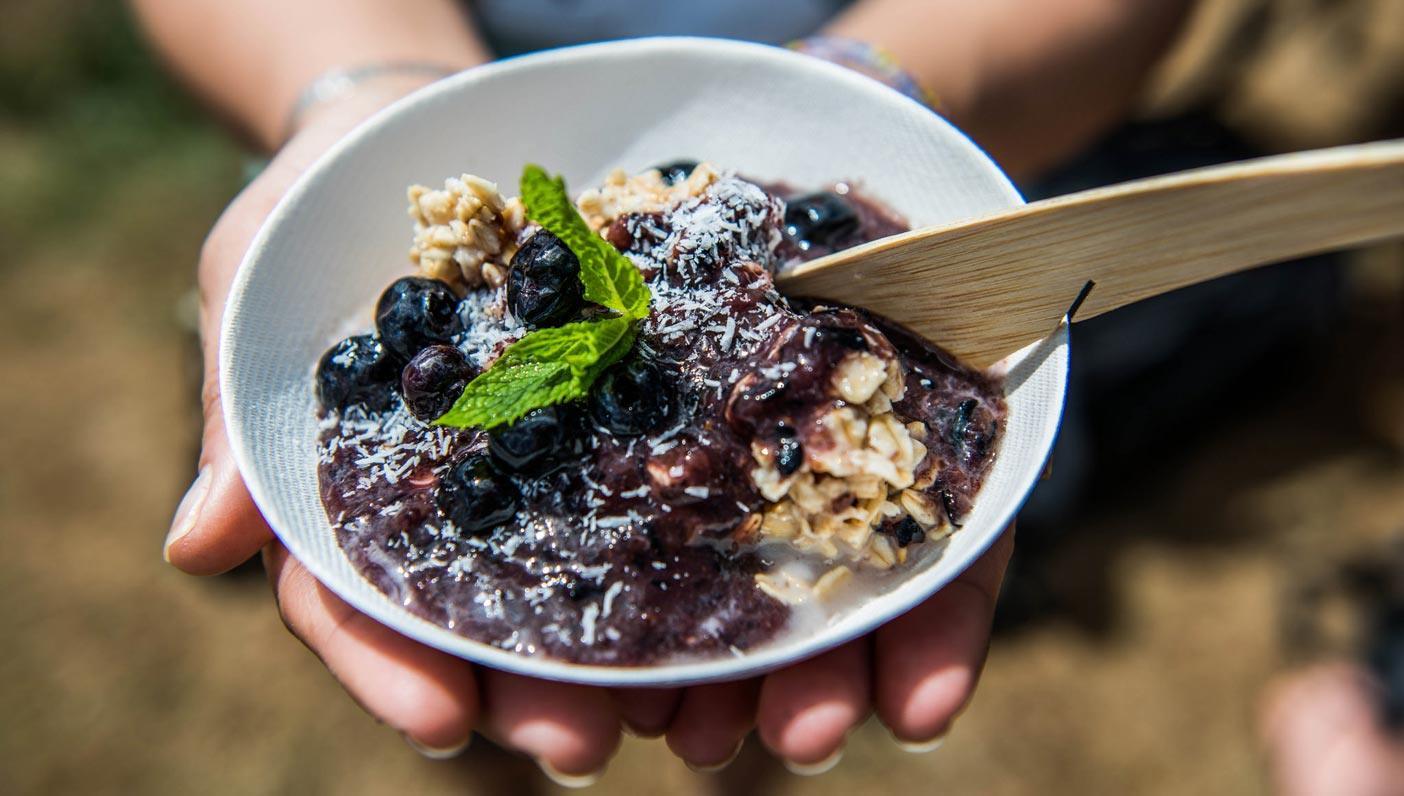
Emily Hightower is a past Wanderlust Festival presenter. For the 2016 lineup, click here.
This article is part of a series on applying yogic philosophy to food. Check out the previous article on Ahimsa.
When we love our bodies, we can listen to them, which is why after Ahimsa comes our second Yama, Satya, meaning Benevolent Truth. This month we get real with our bodies as the most reliable voice for what we truly need, and learn ways to share truth with kindness.
Some truths have a capital “T” in the food world. True: organic, local, whole food is best. If you don’t buy into that, I’ll have to practice a lot of Satya to openly listen, but I might learn something, so bring it. Other truths are really tough to discern, especially in a landscape of misinformation around food. Everyone has a stake in the health food game these days. Words like “natural” or “cage-free” imply a lot, but are meaningless in terms of what you’re actually buying. And every day a new health fact comes out against an old favorite, or that endorses a former enemy. Can I eat gluten, soy, nuts? Is coffee the devil or the supreme elixir? Should I be vegan, pescatarian, or Paleo? Even if you eat organic, real foods, how do you know what your personal food truth is with those endless crouching health-food tigers lurking around every Whole Foods counter?
Much like you know when you’re going too far in a backbend, you probably know when you’re choosing a food that isn’t a match for your body. You can develop these skills with practice. After eating, notice if you feel more or less energized. Ideally a food gives you energy. If it’s not a fit for your needs, it drains energy. A food that is truly good for your body will not make you feel like you need to overeat it to be satisfied. Foods you’re sensitive to can trigger allergic addictions to satiate histamine overdrive. Sure, other variables are at play. That’s why it’s a practice.
Symptoms of food intolerance are general but often recurring in a person. You could be gluten intolerant and continue eating it without observing its subtle effects, developing IBS on the side, or you could tune in and notice that each time you eat it you feel bloated, or lethargic, or turn into a moody person (personal example). You can go further and get tested or take on an elimination diet to learn more about your truth with food, but using your yogic body with your eating experience every day will steer you toward a vital and honest relationship with your foods.
Standing by truth is another yogic practice altogether, especially with food. I’m noticing that the less I attach dire meaning to my truths, the easier they are to follow. They become preferences instead of truths. If I “prefer” the gluten free crust for how it makes me less crazy, that means there isn’t a bright red “NO” sign on regular crust and my rebel soul can calm down and watch me eat the cardboard option without blowing up like a balloon.
Once you have ideas about what works for you, Satya reminds us not to preach our findings as truth with a capital T. Like yoga, modern nutrition teaches that each body is unique. One type of yoga can be medicine for one person and damaging for another, just like milk, gluten, soy, nuts, or cold smoothies. If you find a path you like, it’s tempting to shout it from the rooftops. Just remember your truth today might not even be true for you tomorrow. Your body changes; your food changes. Like yoga, truth with food requires presence and humility.
I learned that the hard way after ruining a few family reunion meals with my amazing Truths. Nothing says “gratitude” for a homemade chili pie like “did you know that non-organic cheese causes mucus and inflammation?” I now humbly offer a practice through Satya of sincere “thank you.” I eat foods in my truth often enough that I know when and where I can sway to meet another truth, like the love and respect of family and friends. Plus, wouldn’t you rather learn a food truth because you sought the light you felt from someone happy, loving, and accepting, rather than being told mid-swallow?
In my Off the Mat Into the Kitchen Course we take Satya even deeper, learning how our intentions stoke our convictions to actually follow the truths we discover along our path with food and life. From Satya we flow toward Asteya, where we imbibe consciously in the circle of life through food’s vital gifts.
—
 Emily Hightower founded Ondalu to empower people to make holistic decisions for their health. Her integrative programs have helped thousands of people including Wounded Warriors, Teens, and Women in Crisis using yoga, nutrition, and nature. Emily guides in person, on retreat, or by Skype and is based in Carbondale, Colorado, with her husband, son, chickens, and huge dog.
Emily Hightower founded Ondalu to empower people to make holistic decisions for their health. Her integrative programs have helped thousands of people including Wounded Warriors, Teens, and Women in Crisis using yoga, nutrition, and nature. Emily guides in person, on retreat, or by Skype and is based in Carbondale, Colorado, with her husband, son, chickens, and huge dog.
